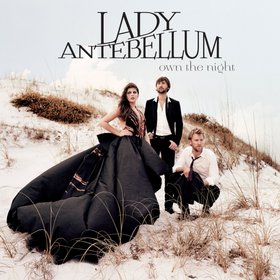There’s really very little difference between the average Taylor Swift song and the songs of Lady Antebellum. They both play melodic, radio-friendly pop love songs that, for little more than geographic origin, the occasional flourish of mandolin and fiddle and a general lack of Autotune, somehow qualifies as country. (What? No cowboy hats? No songs about tractors?) You could easily imagine that it was the same hit-for-hire team supplying material to both acts. Lady Antebellum singer Hillary Scott even sounds a little like Swift, especially on a big, heart-wrenching, string-laden, piano ballad like “As You Turn Away”, one of the highlights of Own the Night.
What most distinguishes Scott and her bandmates, singer Charles Kelley and multi-instrumentalist Dave Haywood, from Taylor Swift (well, aside from the fact that most of Lady Antebellum’s songs are vocal duets) are the stories their songs tell. These aren’t the chronicles and confessions of high school girls and boys, but the backstories and subtexts of those girls’ and boys’ high school reunions.
Never mind that they’re only a few years older than Swift, Lady Antebellum’s songs are the probable middle-aged ever-afters of Swift’s “Love Story”, where the googly eyed crushes of high school are distant memories, and every first kiss is informed by the consequences of how many other first kisses. In “Just a Kiss”, the album’s lead single, Scott and Kelley arrive at a moonlit doorstep at the end of a date and move cautiously to a good-night kiss, singing “I don’t want to mess this thing up.” These are people with pasts.
Two old classmates reminisce separately about a single high school slow dance they’d shared years earlier, before having gone their separate ways in life – “for me you’ll always be 18 and beautiful” – in the lovely and heartbreaking “Dancing Away With My Heart”. Meanwhile, in “Somewhere Love Remains”, a couple who’ve shared a life together find themselves at the edge of splitting up – again. Sure, “Friday Night” is an upbeat, 80s-style rocker (no way this wasn’t written for the soundtrack of the remade Footloose). But it’s still basically Scott and Kelley assuring each other, in playful strings of opposing metaphors – “chore to check off on your list” vs. “lemonade in the shade” – that they don’t want to ever get into a rut.
There are a few moments of sheer giddy pleasure. “Love I’ve Found In You” is a portrait of unqualified domestic bliss, while “Singing Me Home” is all carnal lust on the open road. But these are intermittent escapes from the album’s general sense of tastefully-rendered, elegantly-packaged, thirty-something, romantic melancholy.

